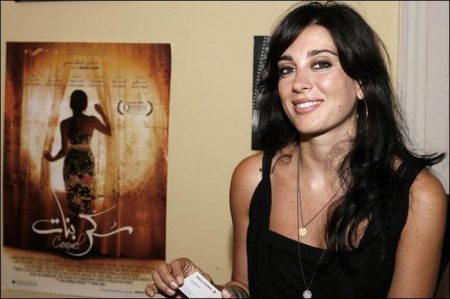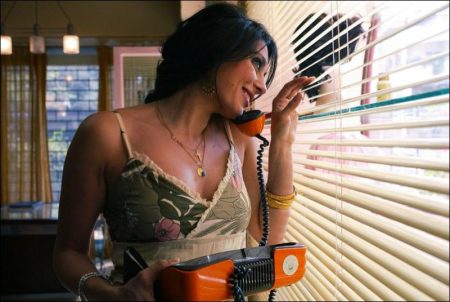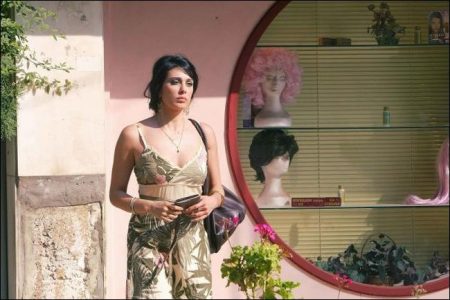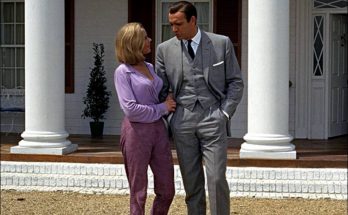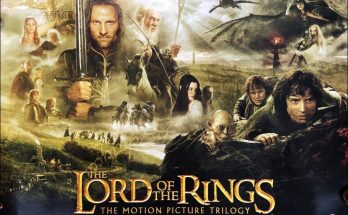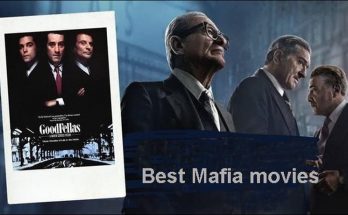What is the subject of your film?
Nadine Labaki talks about her new movie. The story takes place in an isolated mountain village, where Muslim and Christian women join forces, employ various ruses and make certain sacrifices to stop their men folk from killing one another.
Put like that, it sounds like a serious drama, when in fact there are lots of funny moments.
Using irony to deal with life’s misfortunes is a survival strategy, a way of finding the strength to bounce back. In any case, for me it’s a necessity. I wanted the film to be as much comedy as drama, so it would inspire as much laughter as emotion.
While we understand that the country where this war is unfolding is Lebanon, at no point is the name mentioned. Why’s that?
For me, this war between two faiths is a universal theme. It could just as easily be happening between Sunnis and Shiites, between black and white, between two parties, two clans, two brothers, two families or two villages. It’s an embodiment of any civil war in which people in the same country kill each other, when they are neighbors and even friends.
Were you inspired by a true story?
Not at all. The basis for the film is very personal. I found out that I was expecting a baby on May 7, 2008. On that day, Beirut once again slipped into war mode, with road blocks, the airport closed, fires and so on. Violence broke out all around. I was working at the time with Jihad Hojeily, my co-writer and friend, and we were thinking about my next film. In the city there was full-blown street-to-street fighting. People who had lived for years in the same building, who’d grown up together and attended the same schools, were suddenly fighting each other because they didn’t belong to the same religious community.
And I said to myself, if I had a son, what would I do to prevent him from picking up a gun and going out into the street? How far would I go to stop my child from going to see what’s happening outside and thinking he had to defend his building, his family or his beliefs? The idea for the film grew out of that.
So, is it impossible for a Lebanese artist to hope to tackle anything else but war?
It’s not a story about war; on the contrary, it’s about how to avoid war. You can’t live in Lebanon without feeling this threat, which ends up coloring what we do and our ways of expression. If you’re vaguely sensitive to what’s going on around you, you can’t avoid it.
The notion that peace can be achieved through women – beyond their attachment to a religious community – is that a dream or a conviction?
A fantasy, no doubt. War is utter absurdity, an evil that we inflict upon ourselves for nothing, or at least for things that are not worth killing ourselves over. And it was because I became a mother that I felt this absurdity more strongly than before, and that I wanted to deal with a mother’s obsession to protect her children.
WHERE DO WE GO NOW? and Caramel are both centered around female characters. Would you define yourself as a women’s filmmaker?
I’m interested in human nature in general. But perhaps I feel more authentic talking about women because I know their feelings. It’s more of a concern about authenticity than a mission.
Your two co-writers are men. Is that to stick closer to reality when you write about men?
I chose those two male co-writers simply because they are two very sensitive, very gifted and talented people, with whom I get along very well. I think I’ll continue to make films with them; that is, if they want to work with me, of course.
There is a lot of singing and dancing in the film. Why’s that?
That comes from my childhood dreams when I used to watch musical films like Grease and animated movies like Snow White and Cinderella. The film is not a musical comedy in the strict sense, but since I didn’t want to make a political film, the songs and dancing allow me to inject a mood of fairytale and fable. What’s more, the film starts with a narrator announcing that she’s going to tell a story. A little like one says: “Once upon a time.” Some people may object to the film because the events that occur are perhaps too unlikely for my country. Christians becoming Muslims and vice-versa is absolutely unthinkable. But it’s precisely to have the freedom to recount this situation that I didn’t set the story in Lebanon, and that I wanted a sort of imaginary tale.
The character you play is in love with a man who belongs to the other religious community. The feelings are reciprocal but they never own up to it, except through a song that each of them sings in their heads. Is that a way for you to show that such a relationship is impossible in reality?
Even inside their heads, they only voice it in a very restrained way. Even though we like to think that today all that stuff is behind us, a marriage between two young people from two different communities is still very problematic in Lebanon. As much for the family and wider society as for the couple involved. In the film, it is never stated that it’s forbidden, but the two lovers only dare express themselves through a song.
As in CARAMEL, you both act and direct. Is that complicated?
The film overall was complicated, not being actress and director at the same time. The main character being the village itself, we had to handle around 100 people all at once, most of whom were not professional actors.
Why did you use non-professional actors?
Because I like playing with reality, putting real people in real situations and letting them create their own reality. I like experimenting with using their mannerisms, their voices, their way of being. The casting process was intensive. For weeks, a dozen people scoured the streets. But I also chose several professional actors like, for example, the village mayor. His wife in the film is in real life the wife of a man from one of the villages where we shot. During location scouting, she came up just to say “Welcome to our village” and I persuaded her to take a role. She’s fantastic!
Is asking non-professionals to dance a high-risk gamble?
And what’s more, they are women of very different ages and profiles. We had to do a lot of rehearsal, but in the end, it’s not only a fabulous but an unforgettable moment. We shot that scene on the first day, starting the shoot off on a very impressive note. Seeing these women in that landscape with that magnificent light gives you goose bumps.
Did you use only natural sets?
We filmed in three different villages: Taybeh, Douma and Mechmech. The first, located in the Beqaa valley, is really a Christian and Muslim village in which the mosque is next to the church, just like in the narrative. For the sets, again I wanted to stick as close to reality as possible. Together with Cynthia Zahar, we worked a lot on the materials; the texture of the walls, wood, fabrics. You had to feel the passage of time, the poverty, the isolation. The village in the film has endured war, and found itself cut off from the outside world, with neither television nor telephone, connected to the rest of the country by a bridge dotted with landmines and shattered by shelling.
The choice of clothing must have been a complicated exercise since you had to portray each community without caricaturing it. Once again with the aim of authenticity, my sister Caroline, who is the costume designer, did a huge amount of research. It was all the more difficult because I didn’t want to set the story in a precise period. And we had to bring a whole village to life. The walls of the office in which we were preparing the film were plastered with photos of actors wearing their costumes, divided up into color palettes, according to role, to categories, age, order of importance in the film, and so on. It was a real puzzle. A few days before the start of the shoot, there wasn’t a single square inch of that wall uncovered.
Khaled Mouzanar did the music for this film, as he did for Caramel. Did you have a clear idea of what you wanted?
Khaled and I are married; he’s the father of my child. I like his sensitivity and I’m continually surprised by his ability to visualize the images of the film and to translate them into music just from reading the script – sometimes even before the ideas or the scenes are even written down. During the writing period, he picks up on scraps of the story or certain scenes during discussions with my co-writers and sometimes, when I’m in my son’s bedroom reading him a story or else in the kitchen, I’m surprised to overhear a tune that Khaled is playing on the piano which goes perfectly with one of the scenes I’ve imagined. So that’s how the film’s music gradually takes shape. We never sit down and say: “Now let’s discuss the music.” It comes naturally. In the case of this film in particular, that was a good thing because the songs needed to be ready before the start of the shoot. The song lyrics are by Tania Saleh, a very good friend and an extremely gifted artist.
Between Caramel and WHERE DO WE GO NOW?, has Lebanese society changed?
The importance of community and family are such that, even if we’d like to think that people are more emancipated and free in the Arab world, there’s still this sort of fear of “what are they going to think?” The specter of what people are going to say. In Lebanon, the facades of the buildings are often very beautiful with balconies brimming with pretty flowers. But on the other side, the rear courtyard, it’s a garbage dump. The same goes for the people: They pretend to be free and that everything is fine, but in fact, there are many taboos that have yet to be challenged. The reason for this is that we haven’t yet found our own identity. You can see it, for example, in our language. A whole section of our society, educated and cultivated people, no longer speaks Arabic but English or French. Yet it is those people who could speak it the best.
Is that why your film is made in Arabic?
Of course. It’s very tempting to go and make films abroad, and I had some offers to do this. But I turned them down. I’m afraid I wouldn’t be so authentic in a culture other than my own. What’s more, I want to bring life back to this old language which, when it is well spoken, is very beautiful. I’m grateful to my producer Anne-Dominique Toussaint for not having imposed anything on me in this sense. She’s very instinctive and respects what the director wants to say and why they want to say it, without ever trying to exert any pressure, whether commercial or artistic.
Where does the title of the film come from?
From the last line in the film. Just when you think they have achieved something, resolved a situation and found a solution, suddenly, it all seems to fall apart again. The women in the village came up with the ultimate stratagem to make the men understand that war is absurd. They succeeded; but what’s going to happen next? “Where do we go now?” I don’t have the answer to that.
Born in Lebanon, Nadine Labaki passed her baccalaureate in Beirut in 1992.
She obtained a degree in audiovisual studies at Saint Joseph University in Beirut (IESAV), directing her graduation film, 11 Rue Pasteur, in 1997, which won the Best Short Film Award at the Biennale of Arab Cinema at the Institute du Monde Arabe (Paris) in 1998.
She then directed adverts and many music videos for celebrated Middle Eastern singers, for which she won several awards in 2002 and 2003.
In 2004, she took part in the Festival de Cannes Residence to finish writing Caramel, her first feature film which she shot in 2006.
Caramel screened in Directors’ Fortnight in Cannes in 2007 and was a commercial success in France in the summer of that year. The film sold worldwide.
Where Do We Go Now? is her second feature film.
Related Link: View the Full Production Notes for Where Do We Go Now?
Views: 250
